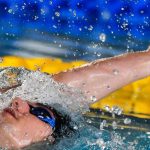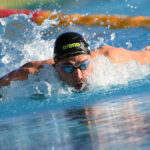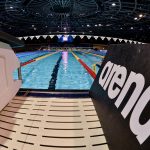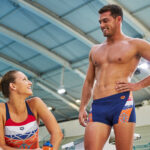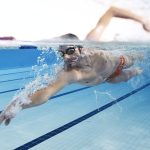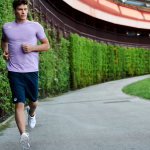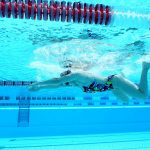Triathlon: everybody in the pool for winter training!
When people ask me “what if it rains?”, I always give them the same answer: triathlon is a sport for men. By that I certainly do not mean that it is for males only, I am just metaphorically referring to the fact that your training should not be affected by the weather. Nevertheless, rain, snow, ice and wind can sometimes jeopardise your winter training.
Of course it is cycling that is most seriously affected during the winter period and you often hear people say “I am taking my bike to be cleaned, I will pick it up again in 3 months”.
But by doing that your entire season is already compromised.
Swimming is certainly least affected by bad weather, except for long continuous sessions in the sea.
But in that case you can use an elastic band attached to the starting block and, depending on how much room you have available, you can perform continuous long drills. I advise against training like this for over 25/30 minutes: you are likely to injure your back or shoulders.
But you can also do you running and cycling in the pool when the weather is too bad to train outdoors, let’s see how!
RUNNING:
– Running in a children’s pool (water height of 50-80 cm). This will allow you to do proper running sessions, obviously taking time rather than space as your guideline and using a heart rate monitor to control the intensity of the exercise (or, alternatively, the old fashioned way of placing two fingers on the vein in your neck). If, for example, I had to train like this today, here is what I would do:
- 3km slow warm-up -> 15 minutes easy running at 120/130 bpm
- 6 x (1km short interval + 2’ slow recovery pace) -> 6 x (time required to complete the short interval at 160/165bpm + 2’ easy running with heart rate at around 120 bpm)
You can also work on strength training in the pool by performing long, slow movements, working with specific resistances, and varying your leg speed and intensity.
– Running with a floatation vest: you can also perform running drills in deep water where you cannot touch the bottom; in this case, with absolutely no ground impact, it is extremely important to work on your breathing, using your arms and maintaining neutral foot rotation.
CYCLING
– Hydrobike: this is a great alternative to ordinary cycling. Thanks to the water resistance, you can work on things like strength endurance and maximum power, but it is not quite so effective for training your cardiovascular system or improving your pedal stroke.
– Running with a tube: in deep water, place a floating tube between your legs for buoyancy purposes and then “tie” a second floating tube to the end of the first for resting your hands on. Starting from this seated position, move your legs in two perfect semicircles. This has exactly the opposite benefits to the previous drill; it really trains your cardiovascular system and teaches you how to develop a “round” pedal stroke, but it is not so effective for strength training.
In any case, you only need to go to the local swimming pool in winter to train for all three triathlon disciplines, so no more excuses.
Written by:
arena coaches
Swim coaches, trainers and experts will give you all kinds of tips for performing at your best in both training and races.
